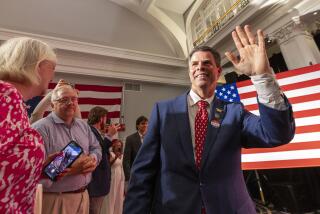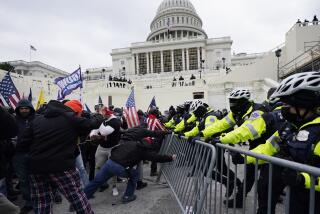Scandal, Intrigue Highlight Virginia Elections : Politics: Oliver North may challenge Sen. Robb, with Gov. Wilder entering fray. Governor’s contest is seen as test of Clinton’s hold on White House.
- Share via
RICHMOND, Va. — This state’s once sedate political landscape is being transformed by an extended, three-way campaign that is tinged with intrigue and scandal and laden with national significance that could help it shape the next run at the White House.
By building on the fame he gained during the Iran-Contra hearings, former Marine Lt. Col. Oliver L. North hopes to become the Republican candidate in 1994 for the Senate seat now held by embattled Democrat Charles S. Robb. And Robb faces the threat of a challenge within his own party from his erstwhile ally, incumbent governor and former presidential candidate L. Douglas Wilder.
Republicans and Democrats are embroiled in a struggle, to be decided in November, for control of the governor’s mansion that Wilder must vacate under the state’s term-limit law.
But far more is at stake in this complex contest than just a clash of personal ambitions. For two decades Virginia has been a bellwether in national politics.
In the 1970s, Republicans forged a conservative coalition and captured the governorship three consecutive times, a feat unmatched anywhere in the Old Confederacy. That foreshadowed the electoral victory that sent Ronald Reagan and George Bush to the White House.
In the ‘80s, Democrats, led by Robb and aided by Wilder, stormed back, creating a counter-coalition of moderate whites and blacks that gave them the governorship three times in a row and presaged the melding of groups that won the White House for the Democrats and Bill Clinton last November.
Now, the Virginia campaigns will test whether Republicans can hold their conservative base while gaining moderate votes, and whether Democrats can maintain their winning coalition in the face of a Robb-Wilder split. The outcome will be watched by 1996 presidential campaign strategists for both parties.
At issue is “which party can best appeal to the vital center of the electorate,” Mary Washington College political scientist Mark Rozell says.
The GOP is confident that President Clinton’s stumbling start in the presidency, Robb’s assorted legal and political troubles and his ongoing feud with Wilder will help their cause.
Although North has not officially declared his candidacy, in addressing cheering Republicans at their state convention here this month he sounded as fiercely partisan as any seasoned campaigner: “I think every single Democrat in the Clinton Democratic Party, which is leading this nation down the tubes, ought to be an issue for every office, whether it is city council or state government.”
Then, urging them on to a conquest of the governorship and to legislative gains in 1993, he added a martial note befitting his Vietnam combat ribbons: “And next year, all across America, Republicans can take one more hill--Capitol Hill.”
Democrats, looking ahead to the 1994 Senate race and trying to maintain unity in the face of the Republican threat, have reason for concern. Incumbent Robb is beleaguered by reports of past dalliances with a beauty queen and alleged attendance at cocaine parties.
And there was a 19-month grand jury probe of his involvement in the tapping of Wilder’s phone conversations. Robb was not indicted. Within Robb’s own party, Wilder could become a formidable adversary.
That prospect is one the senator prefers not to discuss. “I’m concentrating all my energies on the 1993 ticket,” he says. By contrast, Wilder told an interviewer: “I don’t want to hide the fact that I don’t think we have the best representative of Virginia now in the Senate.”
Adding to Democratic anxiety, Wilder, who has promised a decision on his future this month, has not ruled out running against Robb as an independent, a move that would greatly enhance GOP chances.
All but overshadowed by the early maneuvering for the Senate race is the contest to succeed Wilder. Although the Democratic candidate, state Atty. Gen. Mary Sue Terry, is the early favorite, her party is worried that it may have worn out its welcome after holding the governorship for 12 years.
To offset such feelings, Terry promised that her election would launch “a new era of governing in Virginia.”
But Republicans, whose candidate is George Allen Jr., an ex-congressman and son of the former National Football League coach, are determined to exploit whatever blotches they can find in the Democratic record, particularly the Wilder-Robb feud. In a 17-minute video shown to its state convention, the GOP called for “the winds of change” to sweep away “arrogance,” “childishness” and “scandal.”
The turbulence is a far cry from the monolithic stability that prevailed in bygone days when Virginia politics were ruled by the political machine of the late Democratic Sen. Harry Byrd.
“Of all the American states, Virginia can lay claim to the most thorough control by an oligarchy,” political scientist V.O. Key wrote in 1950. “By contrast, Mississippi is a hotbed of Democracy.”
But in subsequent years as Virginia’s rural economy expanded and diversified, and migrants from the North and Midwest swelled its population, the power of the Byrd machine ebbed and the once-minuscule Republican Party began to flex its muscles.
The string of gubernatorial victories that followed anticipated the national Republican ascendancy of the Reagan era. But while the GOP held sway in Washington, the Virginia Republican coalition grew weaker.
As GOP activist Frank Atkinson explains in his book “The Dynamic Dominion,” the coalition deteriorated because of tension between its two major components, the former Byrd Democrats and the increasingly potent Christian conservative movement.
That opened the door to a Democratic comeback, launched in 1981. Led by Robb and aided by Wilder, an aggressive liberal politician, the Democrats forged a coalition of moderate whites and blacks that allowed them to gain the governorship three times, crowned by the 1989 vote that made Wilder the first elected black governor in the nation’s history.
Robb, an ex-Marine whose career got a boost from his marriage to former President Lyndon B. Johnson’s daughter, Lynda, “made it respectable to be a Democrat again,” Emory and Henry College analyst Tom Morris says. “What Wilder did was to verify and legitimize Robb’s civil rights credentials,” boosting the turnout of blacks, about 90% of whom voted Democratic.
In November, the underdog Republicans are counting on the Democrats’ problems in the White House to help them in the governor’s race. Tom King, chief strategist for Democratic gubernatorial candidate Terry, contends that Republican efforts to link her to Clinton won’t work, arguing that the race will hinge on local issues. “She’s independent and always has been independent,” he says.
Republican gubernatorial candidate Allen has problems of his own. He needs to appeal to moderate voters, but they may be turned off by the conservatism of Mike Farris, the candidate for lieutenant governor. Farris’ past advocacy of home schooling could alienate moderate voters worried about undermining the public schools.
Whatever happens in the gubernatorial race, some Republicans are basing their hopes for the party on North’s charisma. After watching North cleave through a throng of hand-grasping admirers at the Richmond convention, delegate Randolph A. Byrd said: “This isn’t like a political event--it’s like a wedding or a bar mitzvah.”
Also in North’s favor is his fund-raising ability. According to a study by the Washington Post that was confirmed by North’s chief of staff, Mark Merritt, North raised about $13 million for his defense against charges stemming from his role in diverting proceeds from the sale of U.S. arms to Iran to aid the Contra rebels in Nicaragua--and another $7 million for his political foundation, Freedom Alliance.
Although he can’t use that money to run for office, the fund raising left him with a huge bank of contributors on whom he can call.
Meanwhile, other Republicans fear that the stigma from the Iran-Contra affair would make North vulnerable in a race against Robb and unable to take political advantage of Robb’s own scandals.
Those concerns were underscored in a June Reader’s Digest article, which contends that many of North’s former colleagues “now say he cannot be trusted to tell the truth--in speech or in print--about Iran-Contra or much else.”
In response, North wrote to his supporters, saying he had canceled his subscription and accused the normally conservative Digest of joining with “other media elites in their vengeful effort to destroy me.” He also sought to dismiss the charges as “old news.”
But even as he tried to shrug off the charges, he offered fresh evidence of what may be a tendency to improve upon the truth.
In contending that Iran-Contra would not be an campaign issue, he said at a Richmond press conference: “Here’s the issue. I had a real trial, (with) real jurors, real judges, and I won.”
The fact is that North actually lost. He was convicted of three Iran-Contra charges, but a federal appeals court later, in effect, voided those convictions on the grounds that witnesses against him might have been influenced by his televised testimony on the case before Congress.
More to Read
Get the L.A. Times Politics newsletter
Deeply reported insights into legislation, politics and policy from Sacramento, Washington and beyond. In your inbox twice per week.
You may occasionally receive promotional content from the Los Angeles Times.










